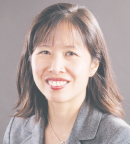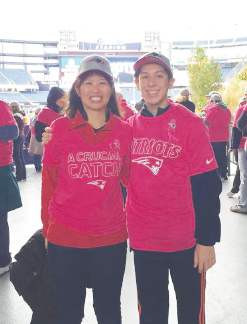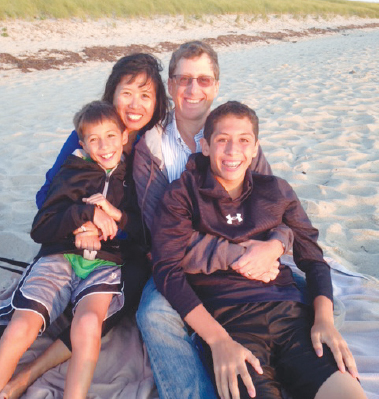
Beverly Moy, MD, MPH
Beverly Moy, MD, MPH, grew up in Brooklyn, New York, in a modest working-class home. Both her parents were immigrants from China. “Education is highly prized in Chinese culture, and my home life was no exception. I didn’t speak any English when I began kindergarten, so that was a bit challenging, but in our family, the ethos was all about school and working as hard as you can to achieve your goal—no matter what obstacles you faced,” Dr. Moy said.
A Love of Science
Asked whether her education-oriented parents pushed her toward a career in medicine, Dr. Moy replied: “Naturally medicine was a much-valued career choice, but interestingly my parents didn’t encourage me to become a physician. They thought the educational and training path to medicine was too long before I’d be able to establish myself. However, I always remember wanting to be a doctor. I loved science and the idea of taking care of sick people. So becoming a doctor was a perfect fit for me.”
- NAME: Beverly Moy, MD, MPH
- TITLE: Associate Professor of Medicine, Harvard Medical School; Clinical Director, Breast Oncology Program, Massachusetts General Hospital, Boston
- MEDICAL DEGREE: MD, Albert Einstein College of Medicine, the Bronx, New York; MPH, Harvard School of Public Health, Boston
- NOTABLE HONORS
- Nathaniel Bowditch Award at Massachusetts General Hospital for improving quality of care while reducing costs (2017)
- Jane Grier Memorial Prize at Massachusetts General Hospital for excellence in teaching (2010)
Dr. Moy continued: “I had a really good childhood experience growing up in a close, tight-knit family in Brooklyn. I’m a product of the New York City public school system. My high school had a robust community outreach program, and I volunteered at Coney Island Hospital. There I had many clinical experiences with patients that I doubt they would allow today, which is too bad because it’s a truly formative experience for a young person, especially someone who aspires to a career in medicine.”
Johns Hopkins: An Eye-Opening Experience
When it came time to apply to college, one component of Dr. Moy’s decision-making process loomed larger: She wanted to be south of New York. “I applied to one school, Johns Hopkins, and was accepted so off I went. I was fortunate enough to have received a scholarship, which made it affordable. College was an eye-opening experience because it was truly the first time I was forced to think and problem-solve independently. My Hopkins’ education informed a lot of my thought processes as I moved forward.”
During Dr. Moy’s time at Johns Hopkins, she became interested in the health-care needs of underserved populations. “I was accepted to Albert Einstein College of Medicine in the Bronx, New York, which is a teaching hospital with a similar culture to my volunteer experience at Coney Island Hospital when I was in high school. Albert Einstein was an amazing experience; the philosophy is to let students have a lot of autonomy; so by the time I received my medical degree in 1996, I was completely prepared for internship. I had no anxiety about caring for sick patients,” she revealed.
“First and foremost, I take care of women with breast cancer and think it is vital for an investigator to have clinical experience, as that is what informs the best research.”— Beverly Moy, MD, MPH
Tweet this quote
Off to Boston
Dr. Moy continued: “After graduating with my MD from Albert Einstein, I was lucky to match at Brigham and Women’s Hospital in Boston, where I did my internship and residency in internal medicine. I think my decision to pursue a career in oncology might have been formed from direct experience. When I was in high school, the mother of one of my best friends was diagnosed with breast cancer, and when we were in college, she recurred with metastatic disease and died. So I saw first-hand how cancer affects a whole family, and it had a profound effect on me. In medical school, I was drawn to serious chronic illnesses and loved caring for women. After my first rotation in oncology at Brigham and Women’s Hospital, I made my decision to become an oncologist and never looked back. To me, it’s absolutely the greatest professional field to be in.”
Dr. Moy described her residency at Brigham and Women’s Hospital as a career-shaping time during which she met many physicians she considers mentors and role models to this day; she also was introduced to cutting-edge research. In 1999, Dr. Moy began a hematology-oncology fellowship at Beth Israel Deaconess Medical Center, which she said was “a very clinically heavy, rewarding experience.”
During her fellowship, Dr. Moy received a National Institutes of Health training grant, which allowed her to attain an MPH from Harvard School of Public Health. “I did my Masters at the same time I was doing my fellowship work and into my junior faculty year at Massachusetts General. That opportunity let me explore how I would later approach my clinical research in racial and health disparities in cancer care. I’ve been very fortunate to have had tremendous schooling and training along the way,” she added.
“After my first rotation in oncology at Brigham and Women’s Hospital, I made my decision to become an oncologist and never looked back. To me, it’s absolutely the greatest professional field to be in.”— Beverly Moy, MD, MPH
Tweet this quote
Once a Rival, Now a Treasured Home
Dr. Moy conceded that as a New Yorker, she grew up with a bit of a chip on her shoulder about Boston sports teams and other good-natured rivalries. “However, I fell in love with my future husband in medical school and to stay together decided to relocate to Boston as my home. I have been here since 1996 and cannot imagine living anywhere else. It has such an academic and intellectual atmosphere, plus a rich history.”
Dr. Moy’s current position requires that she wear several hats. “First and foremost, I take care of women with breast cancer and think it is vital for an investigator to have clinical experience, as that is what informs the best research. I also direct a cancer care equity program for my institution, which is a multipronged initiative where we provide ways to increase enrollment in clinical trials, access to quality care, and patient navigation to cancer screening for those in underserved communities. Within that program, we also conduct research into ways to improve health-care equity. That work offers me a chance to mentor junior faculty and trainees. It is one of my most rewarding activities, especially when I see one of my mentees achieve success in the oncology community. Naturally, there’s a lot of administrative tasks involved to tie all these things together.”

At a Patriots’ game with son, Corey
Work With ASCO
Dr. Moy is a former Chair of ASCO’s Advisory Group on Health Disparities and Ethics Committee. She currently serves on ASCO’s Breast Cancer Consensus Panel as well as the Government Relations and Scientific Program Committees. Asked for a final thought or two on her work in access to care issues, Dr. Moy replied: “I’ve been so fortunate to work with ASCO over the past years, and I’m very heartened that the oncology community deeply cares about access and equity issues. However, as a country, there’s a lot of one step forward and one step back in making progress."

From left to right: son, Danny; Dr. Moy; husband, Brian Jacobson, MD; and son, Corey
"The current political climate makes it difficult to gain traction, but one of my most rewarding experiences is serving on ASCO’s Government Relations Committee. A couple of weeks ago, I was up on Capitol Hill with a couple hundred ASCO volunteers. We sort of took the Hill by force and had important dialogue with policy makers on these issues. It’s a constant battle—but one worth fighting.”
What does a super-busy oncology leader do to decompress? “I love to cook, hike, and spend time with my two teenaged sons. One son is getting ready to head off to college, so I cram in as much time with him as possible,” Dr. Moy shared. ■

